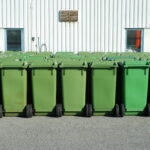Two Massachusetts higher education institutions recently shared the efforts they are taking to divert food from disposal and to combat hunger in surrounding communities. Wellesley College is joining the list of Massachusetts schools, colleges, and universities participating in the Food for Free donation program. Food for Free is a Cambridge-based non-profit that rescues excess fresh…
The Daily Free Press recently described how a Boston-based startup, Food for All, is combating food waste and considering a new partnership with Boston University (BU). Food for All launched in partnership with the Harvard T.H. Chan School of Public Health in October 2016 and is rapidly expanding. The startup aims to prevent edible food…
A recent Waste Dive article discusses the growth of the food recovery marketplace in Massachusetts, including expansion in tons of diverted food waste, quantity of customers served by organics waste haulers, and number of end-sites available for processing food waste. This article was based on a presentation by MassDEP at its Organics Subcommittee meeting held…
Mashable’s new series, A Cleaner Future, recently highlighted the food recovery software platform Spoiler Alert in their segment Reducing Food Waste with Technology. Spoiler Alert, a Massachusetts-based organization, helps food service businesses track and donate unsold inventory. Emily Malina, Chief Product Officer, explains how the software syncs with the business inventory lists to show unsold…
A recent Boston Globe article describes how local celebrity chefs and upscale restaurant owners are finding creative ways to reduce food waste. By tracking food loss, utilizing all edible food, and holding employees accountable, these businesses are saving money on purchasing while creating flavorful dishes. Here are a few outstanding examples, showcasing how Massachusetts restaurants…
In March, the Cambridge Department of Public Works (DPW) called the RecyclingWorks hotline to find an outlet for the surplus food from a meal prepared for their overnight snow crew. RecyclingWorks provided the Cambridge DPW with several potential food rescue outlets to help donate these surplus meals. The Cambridge DPW connected with the St. Bartholomew’s…
Spoiler Alert, a company which offers software to facilitate the donation of surplus food, created a list of resources for food waste in all six New England states. The section for each state has information on relevant state laws and waste bans, state agencies, and non-profit organizations that work with food waste diversion and donation.…
Boston College Dining Services collaborated with a student group on campus to create a “trash dinner” comprised entirely of pre-consumer food scraps. The event was designed to encourage students to think about wasted food and creative ways to reduce it. The menu for the trash dinner incorporated parts of food that are frequently discarded such…
There are substantial changes coming to date labels on food, according to an article in The Washington Post. The Food Marketing Institute (FMI) and the Grocery Manufacturers Association (GMA), the two largest groups representing the grocery industry, announced that they’ve adopted standardized, voluntary regulations to clear up what product date labels mean. Currently, manufacturers can…
In January, WCAI reported on the organic waste recycling initiative on Martha’s Vineyard. Composting Program Coordinator, Sophie Abrams, is leading the feasibility study and pilot composting program to recycle organic waste on the island. This initiative is in response to the Commercial Organics Waste Ban, which bans businesses and institutions that generate of one ton…

